Southwestern Uganda and Paula's Here Safe!
I haven’t posted since last Thursday- Shereen, Hasifa, Nuhu, and I left for Kabale, which is in the southwestern part of Uganda- it’s mountainous and a mix of barren hills, verdant valleys, and empty plains- but everywhere you go, you can tell that this place is big on agriculture (will go in to depth more in a bit).
Our first stop was at the Kamwezi Health Center, which is a Level 4 facility (like the one in Apac- one step down from a full on national hospital). It turns out that many of the people we were looking for weren’t there, so we just mentioned the possibility of oding surveillance at the site, and then left. I did take a picture of this poster for Aliza, and her recurrent leprosy attacks.
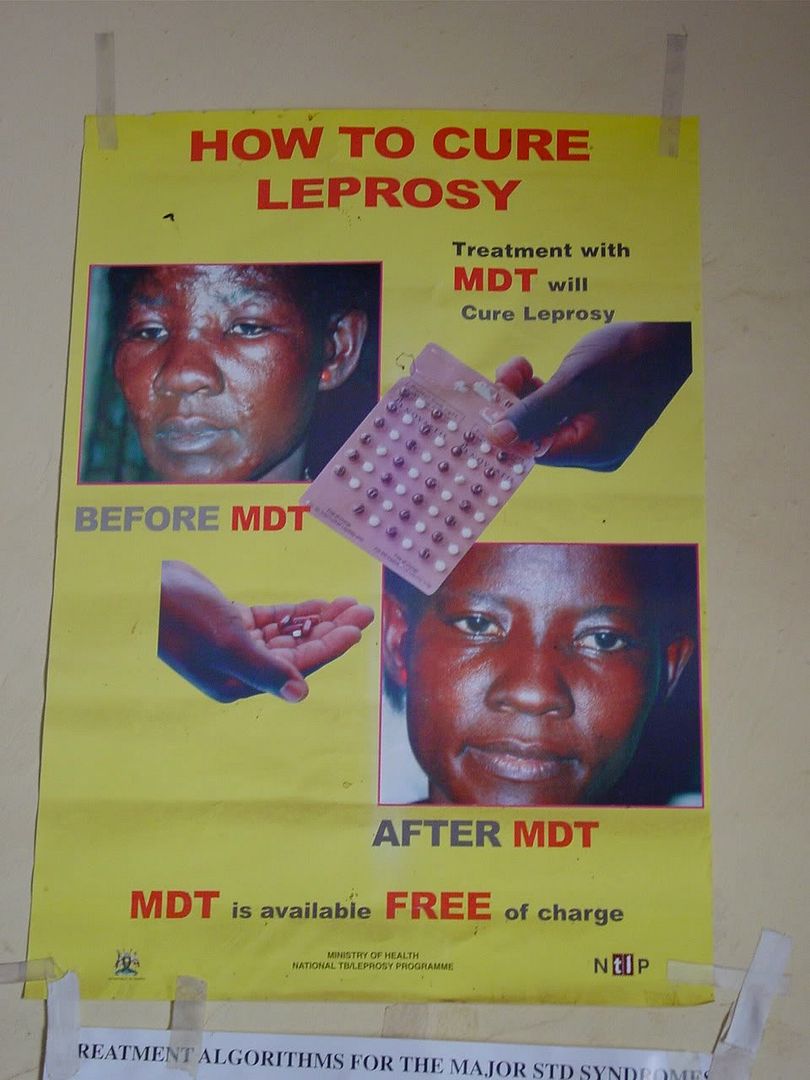
After Kamwezi, we went to the Kabale Hospital (Level 5, full on hospital) to set up a surveillance project there. We got a chance to sit in and talk to a variety of people there too, but didn’t get a hold of the big boss in charge. They had already started surveillance at this site, and we were wondering if we should ask them to change to the new system that we had come up with at Kamwezi. We didn’t come up with any solid procedural change decisions, but discussed the option of using carbon copy books at the site.
It was still somewhat early, but we had no more work to do that day, so we went into Kabale town and looked for lodging. In a random store, I found a collection of dusty wine bottles, and was curious enough to pull one down- it ended up being a bottle of “Altar Wine” bottled in Kabale… which has no vineyards that I could see. It also had no date on it, and looks rather old- The text on the bottle says, “This Wine has been especially bottled for Church use having been approved by the appropriate authorities.” I don’t know who the appropriate authorities are, but I don’t think I’ll ever try to actually drink this wine.
The next morning, we went back to Kamwezi, and stopping here when more staff were present was actually quite productive- one of the staff members had a good idea to streamline the flow of patients through our surveillance system. Basically, instead of forcing the patients to register with the head clerk, then returning later to fill in the rest of their information, we came up with a way to just let the patients see the clerk once, at the end of their visit. This is really promising in that it cuts the number of people waiting to see the clerk in half, and at a facility that sees ~1500 people a month, cutting that number in half is a big deal. We also hope that if we can get this system adopted at other places (namely Apac) we can deal with the whole falsifying data problem- if the patients only see the clerk once, the clerk would not have any partially filled out info- it’s there or it’s not, and as long as that is true, it’s unlikely that he would have to “fill in” any missing data. If he misses a ton of people, it’s not as worrisome as falsified data, as long as the people who are missing are just a random sample of the population (ie, hope that people with malaria don’t systematically show up whenever the clerk is on the toilet).
After that, we drove over to Kanungu, which was a pretty big disappointment- it turns out that all the staff there were being transferred, so talking about surveillance to this group was problematic in that they would all be leaving in a week… but we did manage to save the head clerk from being transferred (Hasifa called his boss and managed to keep him at the Level 4 in Kanungu).
We basically bummed around the rest of the day- I ended up wandering around, went to a drug shop to see what anti-malarials they had, and then wandered my way into a pool hall. Pool in Uganda is pretty different from that in the States, mainly in the size and quality of the balls coming out of the coin-op pool tables. Fortunately, I had time the day before in Kabale, and had found a pool table there to play on (and get a feel for how the balls roll). The balls here, instead of being numbered and being nice and heavy marble pool balls, are made of much lighter plastic, and are painted either red or yellow (with one cue ball and one black eight ball). They have a variety of different rules too, so after standing there and watching for a while, I got a hang of how they played.
The entire time I was there, I heard a lot of jokes and laughing, most of them with the phrase “mzungu” or “foreigner” in them- it seemed pretty good-natured, and I didn’t really mind too much. It wasn’t too long before one of the natives challenged me to a game, and even offered me the handicap of shooting twice to every shot he took! Thank god Dad taught me everything I know about pool, and how to play a semi-decent game. After a sank my first ball, everyone was laughing and yelling, and after I sank the second ball, they were really getting excited, probably because they expected me to suck big time. I managed to win that game, and after 3 more challenges, broke even with a 2-2 record. The local pool shark (he was by far the best player in town, and I only won against him when he sank the 8 ball on the break) surprised me when he yelled to me, “mzungu! I want to kiss you!” followed by another comment a while later, “mzungu! I love you!” He was a pretty friendly guy, and we all laughed, but when I mentioned what he said to Hasifa later, she was pretty shocked. Apparently being gay is against the law in Uganda, and even jokes about it are shocking to some.
Pool buddies: guy in center was the first to challenge me, guy on right is the pool shark.
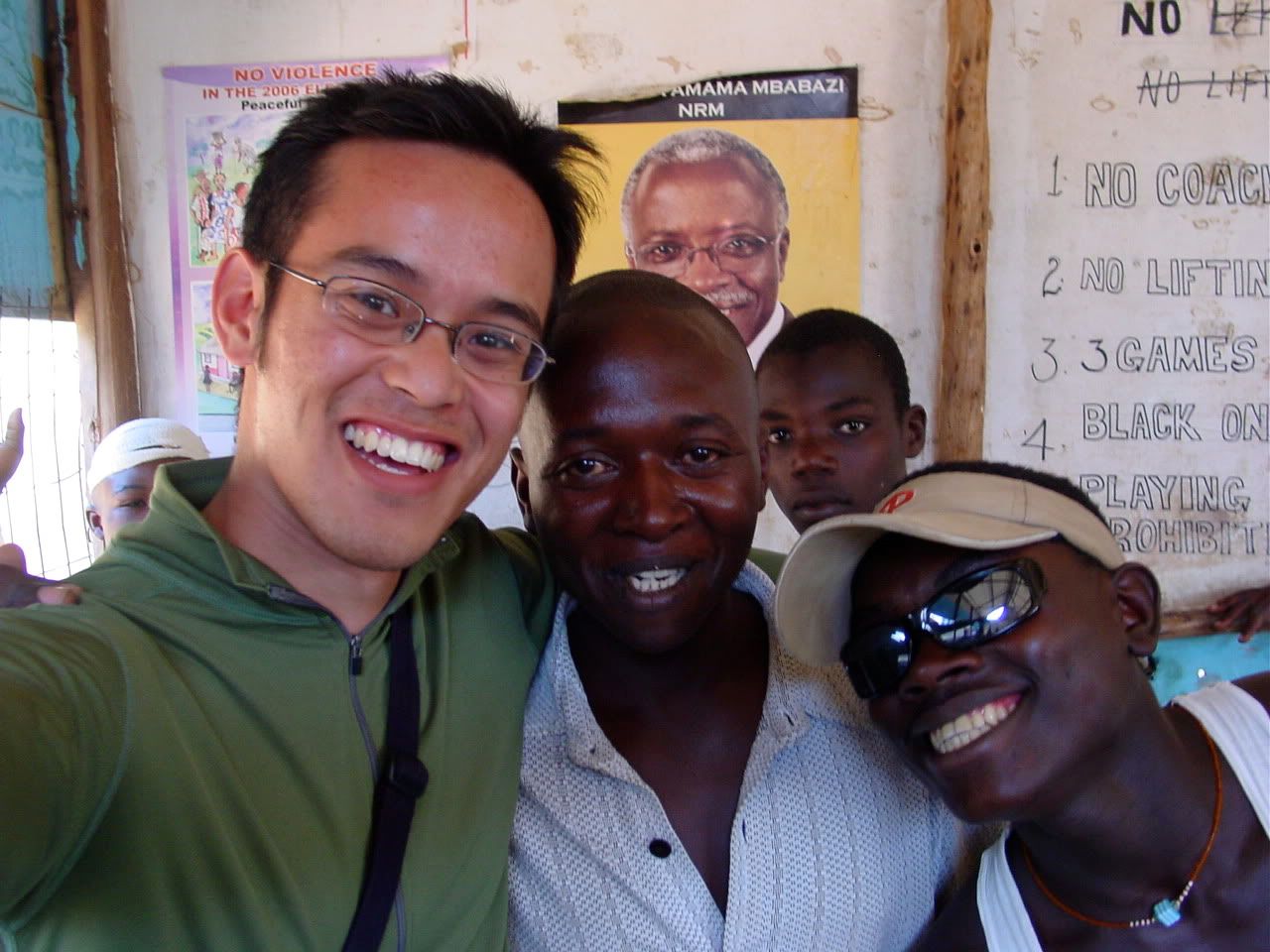
The landscape, as I indicated earlier, is really hilly/mountainous, and very pretty. Here’s a sample of a few different landscapes we saw along the way:
Mountains:
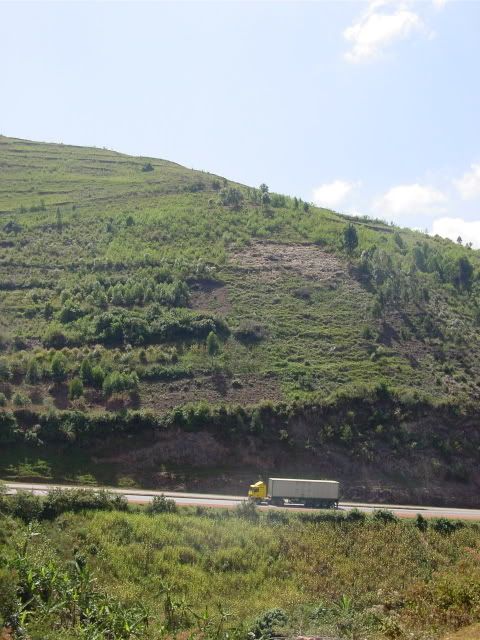
Green Hills:
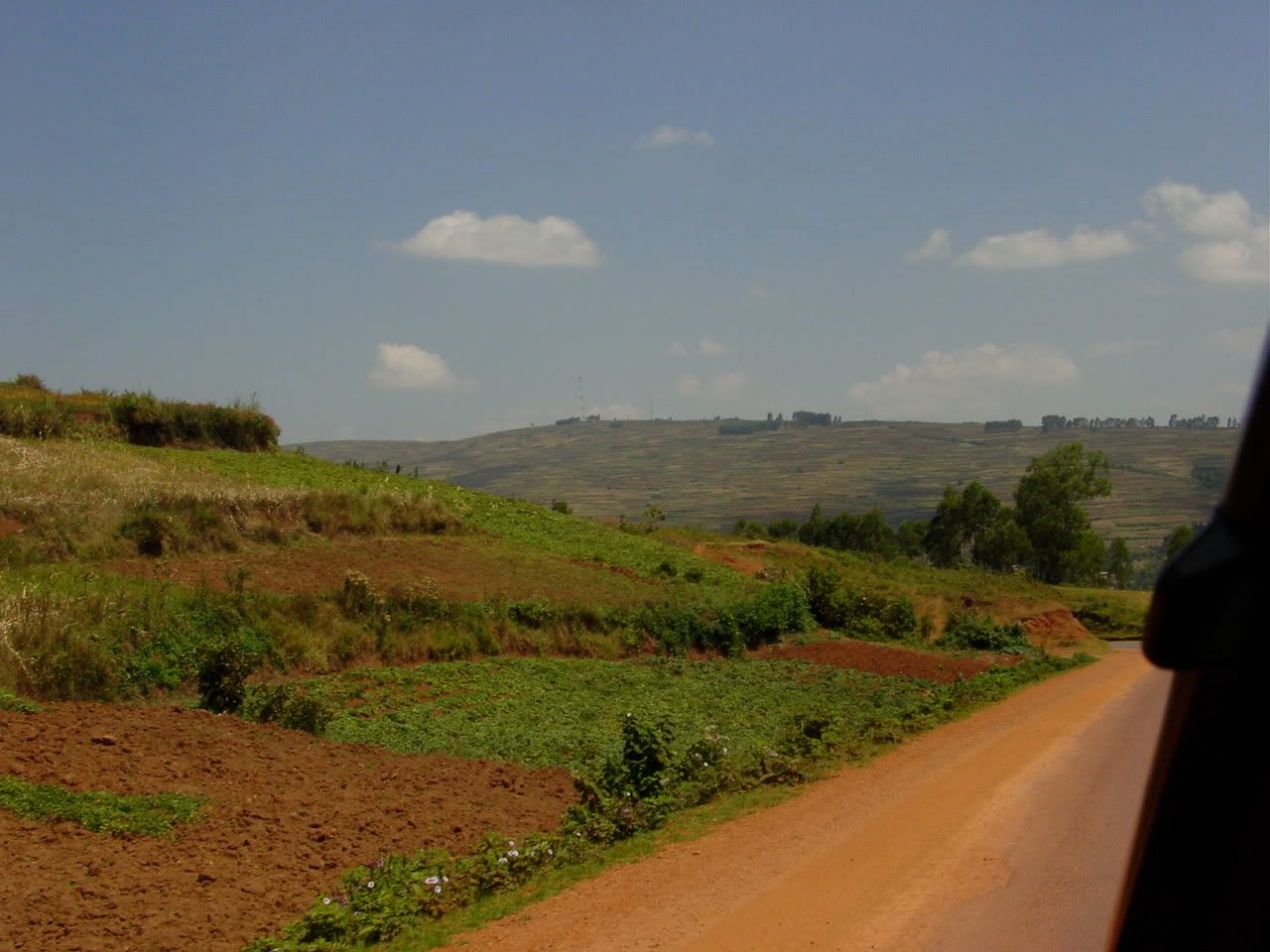
Desert plains:
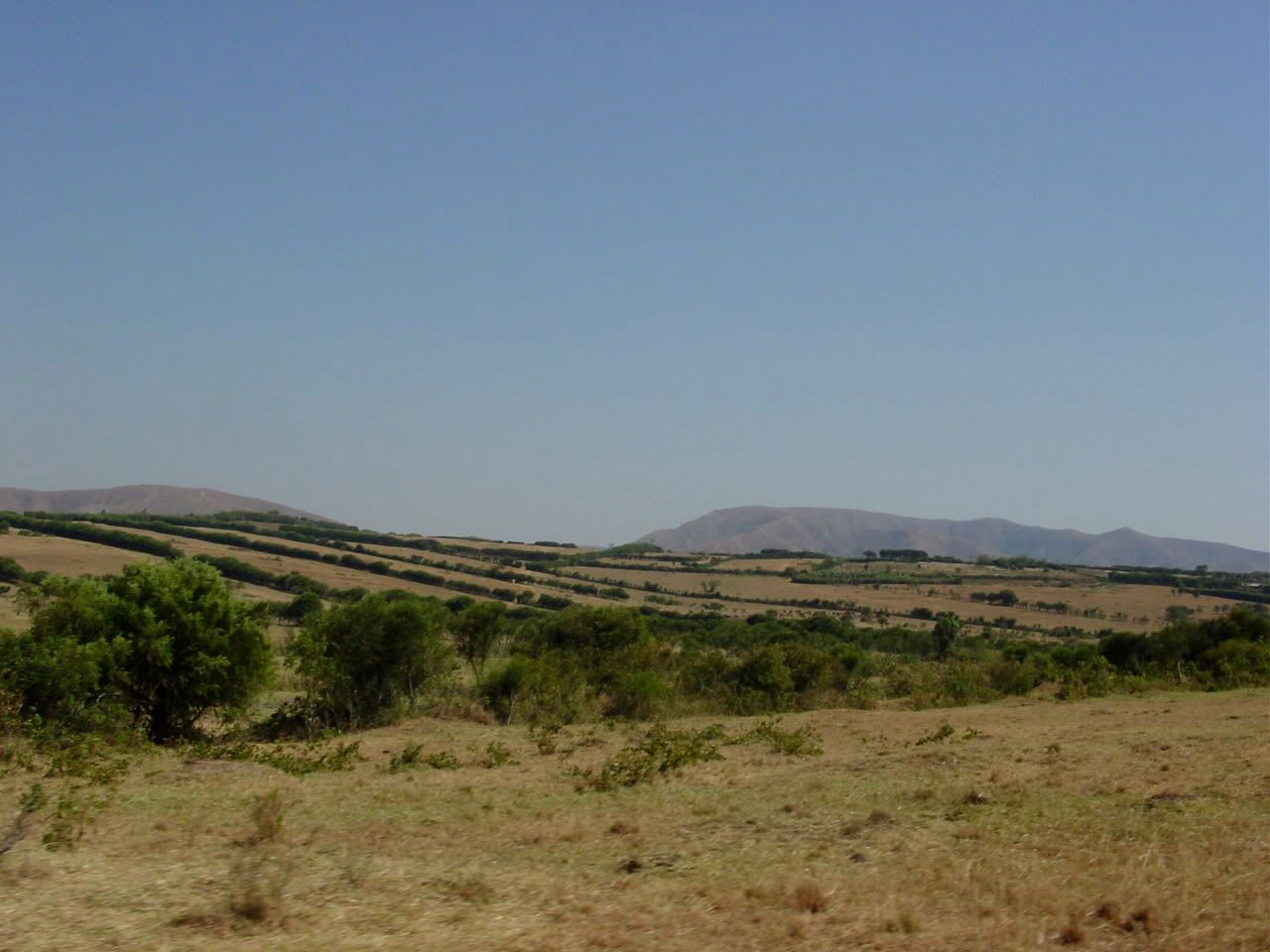
Rock Quarry:
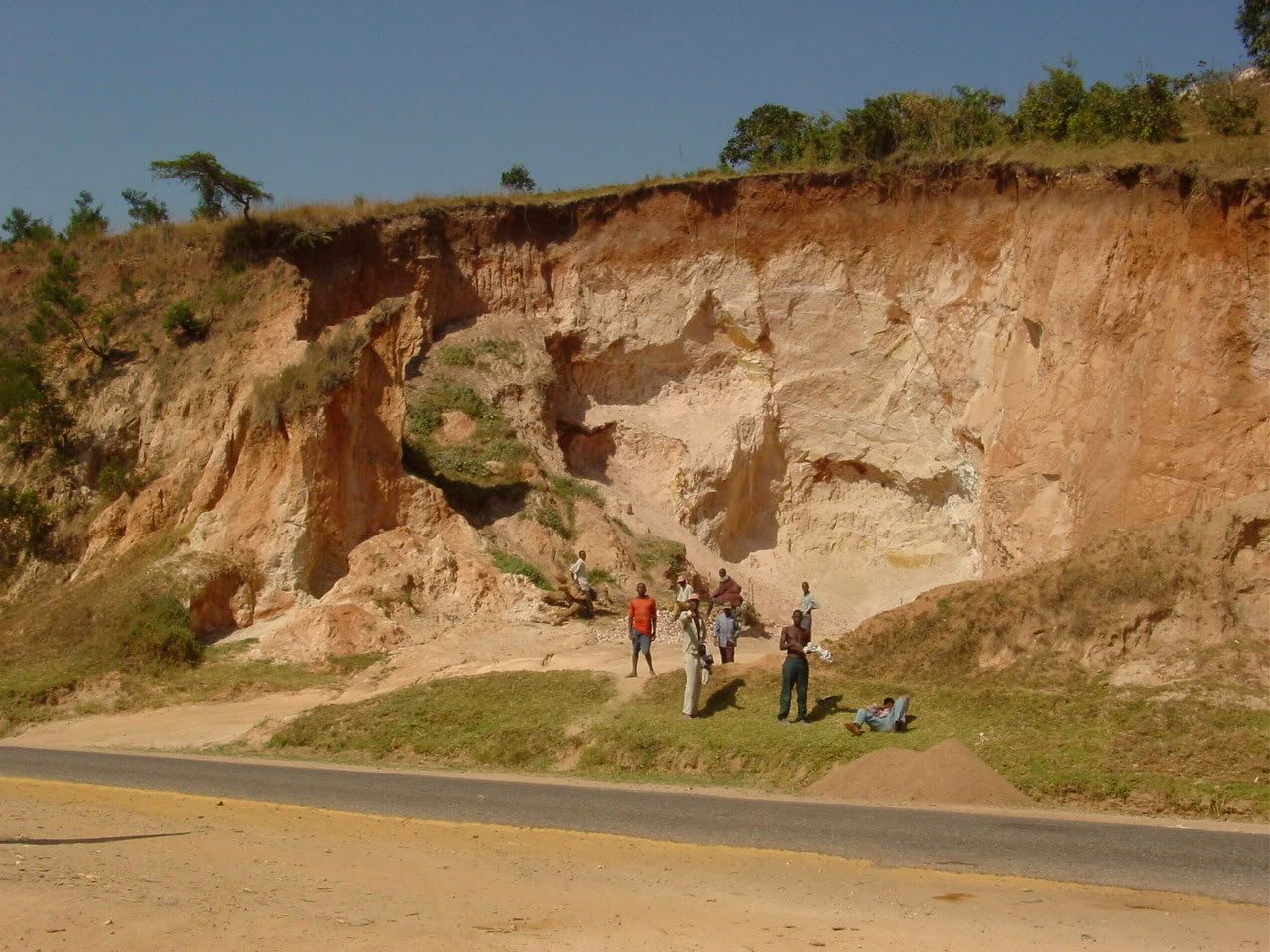
Reminds me of the San Jose hills- as I'm driving down to Hoser's house (Miss you guys, we'll definitely get together after I get back)
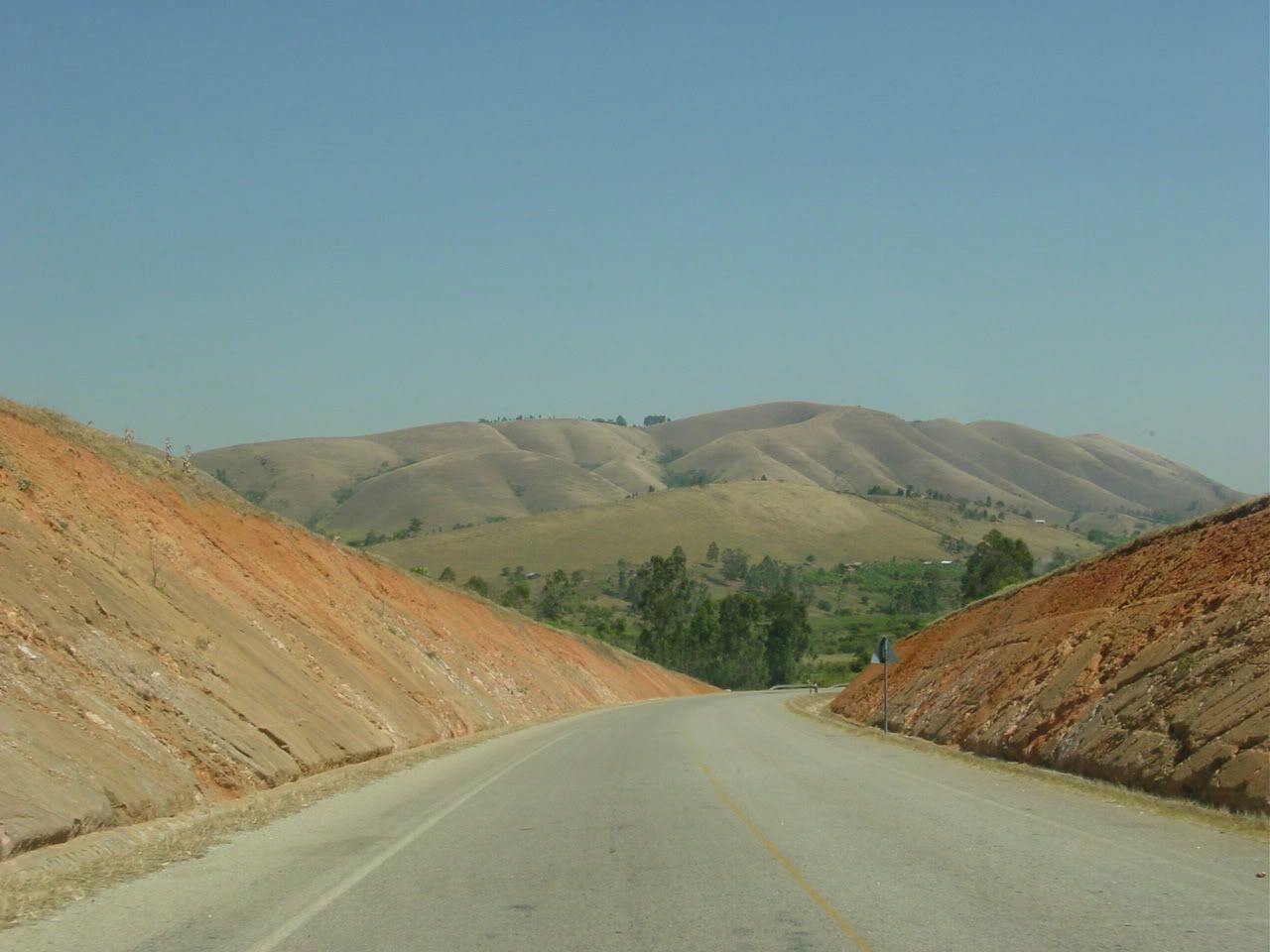
I had overheard some previous conversations while I was in Apac that the ground was so fertile in parts of Uganda that it seemed that Uganda should be even more of a breadbasket for Africa than it is now- that it could really stand to develop more of the land that was just lying there unused. While this might be the case for Apac, it seems that Kabale and Kanungu are serious about their agriculture. At many of the places we drove through, there were little signs all over indicating that this plot was a site for developing better varieties of irish potatoes, or plantains, or other types of agricultural products. They had acres and acres of plantain trees all over, and produce stands all over the place with dirt cheap produce. Nuhu and Hasifa took a bit of time to buy bulk groceries here (like a Costco trip- the entire pickup bed was full with food by the end). Hasifa said that she had bought enough onions to last her the rest of the year… 5 months of onions in one go.
Plantain Forests
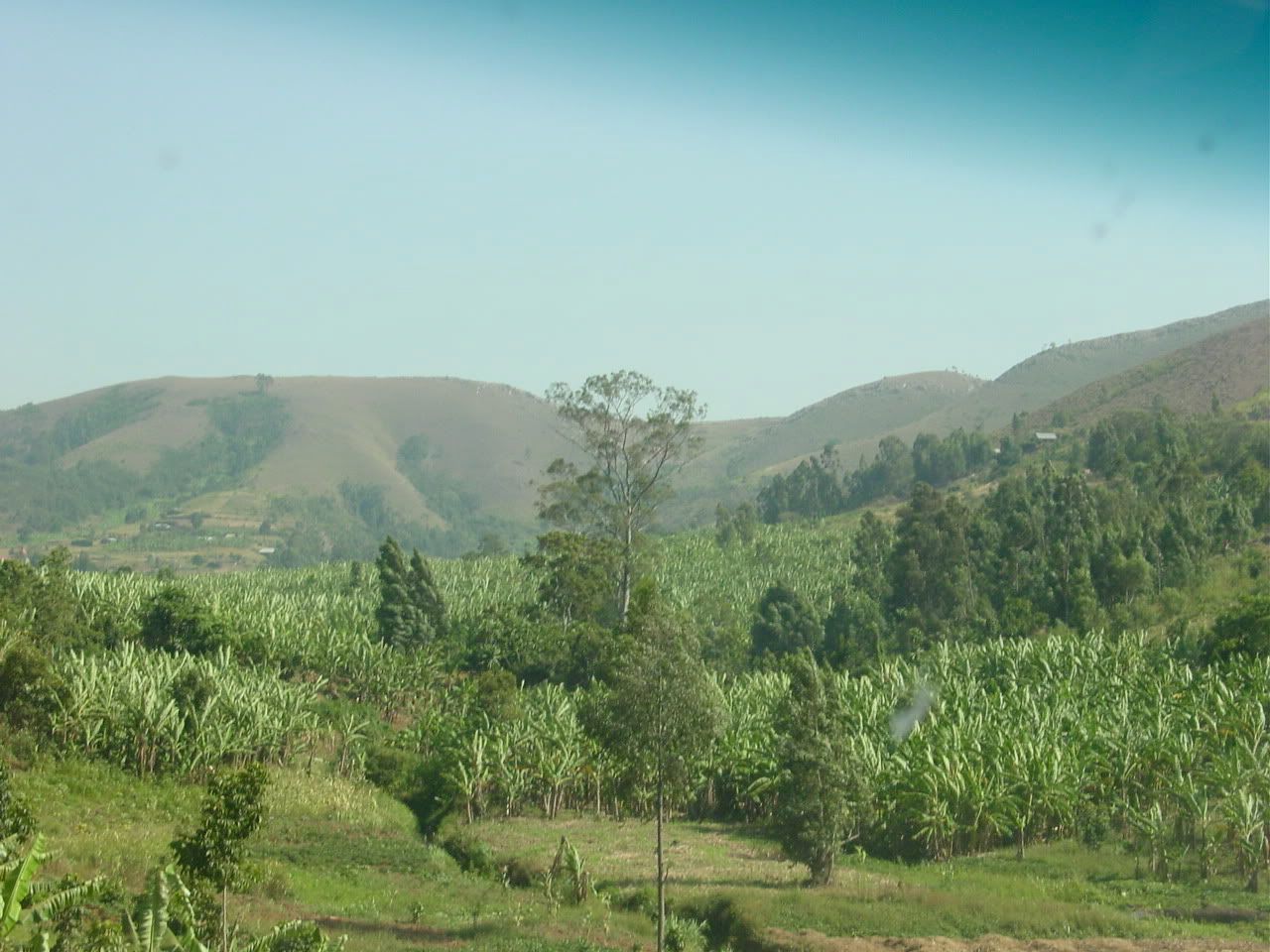
Hasifa buying onions:
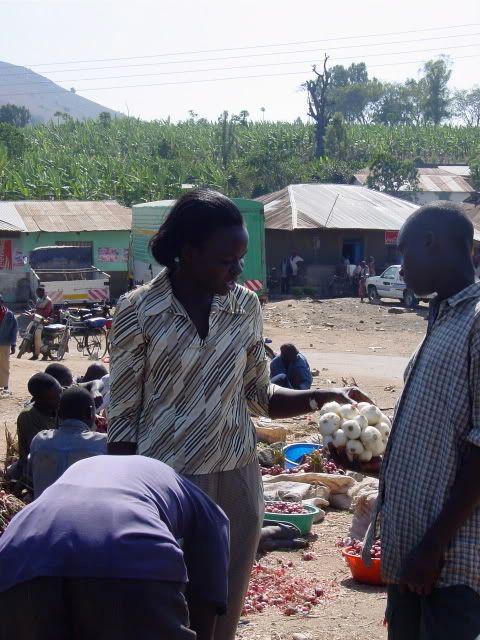
Matoke (Plantains):
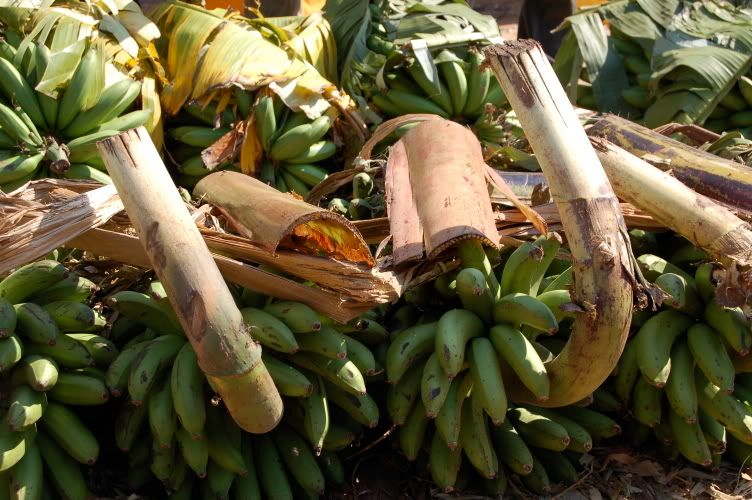
After all the surveillance work was done, it was Saturday morning, and we left to get back to Kampala in time to pick up Paula, who was arriving on a 9 pm flight. After a minor car breakdown problem, we made it back by mid-afternoon, and later that night Nuhu came back to get me and we both went to Entebbe to pick up Paula, who got out of security 5 minutes after I got to the airport.
Car Breakdown (front right tire, gasket seal leaking grease).
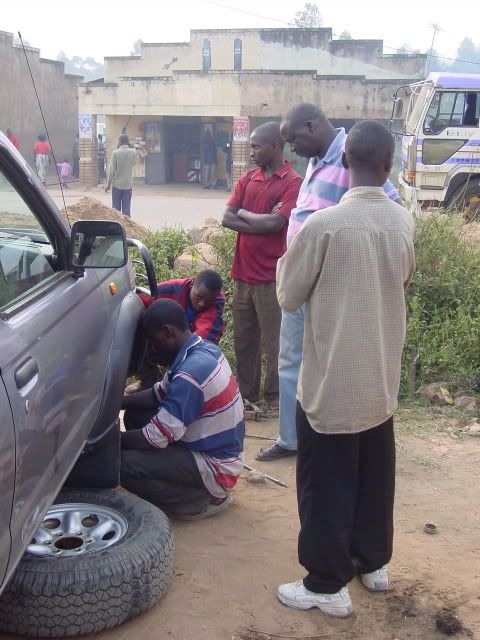
Paula ended up sleeping in till about 2 pm (the construction and the roosters kept her up for part of the night, and with jet lag on top of that, it was to be expected). She was really funny about the entire thing- she told me about how wonderful her flights were, and that when she was in Dubai airport, she thought “I want to come back to Africa!” even though she wasn’t even here yet!
And yes, Africa is rather beautiful:
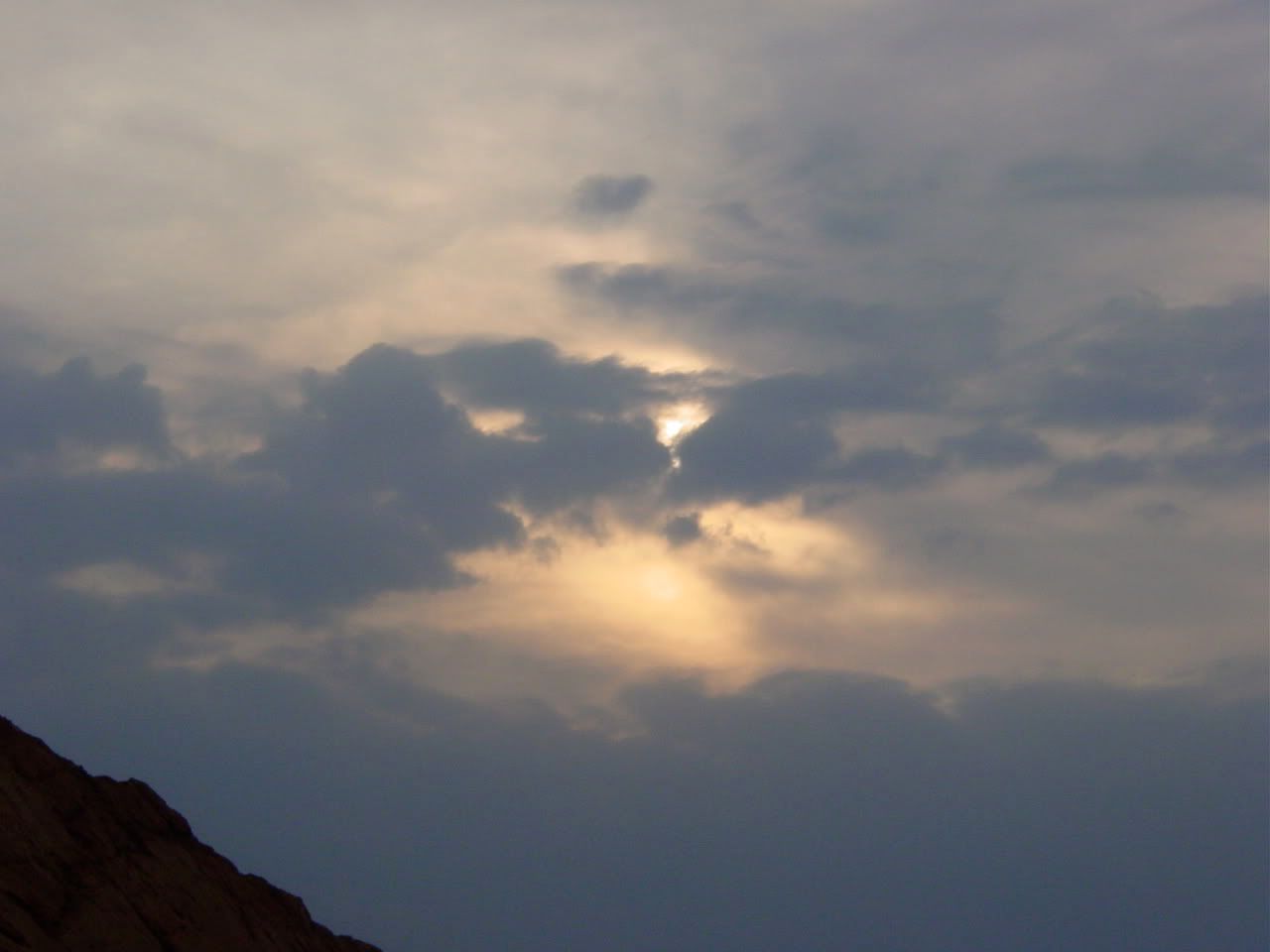
We walked around town, and she was way more comfortable with Africa relative to the way I was my first week here. She wasn’t put off by the staring, and she really had a good time on the boda-bodas. It is a pretty fun way to get around town, but we’ll probably go back to matatus to save money and our lives for the next few days in Kampala. Our plan for her stay here is Kampala for 3 days, Murchison National Park for 3 days, Jinja for 2 days, then she leaves after that. I leave a week after she does- it’s been a pretty eventful summer in Africa.
P.S.- Aliza survived her gorilla trek, and if we ever figure out how to get the pictures off her camera, she'll do a guest posting.
Last picture of all of us- the big family:
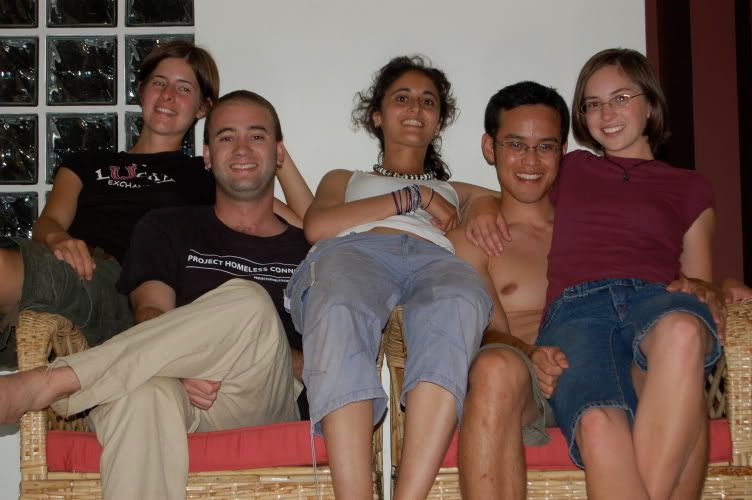
Our first stop was at the Kamwezi Health Center, which is a Level 4 facility (like the one in Apac- one step down from a full on national hospital). It turns out that many of the people we were looking for weren’t there, so we just mentioned the possibility of oding surveillance at the site, and then left. I did take a picture of this poster for Aliza, and her recurrent leprosy attacks.

After Kamwezi, we went to the Kabale Hospital (Level 5, full on hospital) to set up a surveillance project there. We got a chance to sit in and talk to a variety of people there too, but didn’t get a hold of the big boss in charge. They had already started surveillance at this site, and we were wondering if we should ask them to change to the new system that we had come up with at Kamwezi. We didn’t come up with any solid procedural change decisions, but discussed the option of using carbon copy books at the site.
It was still somewhat early, but we had no more work to do that day, so we went into Kabale town and looked for lodging. In a random store, I found a collection of dusty wine bottles, and was curious enough to pull one down- it ended up being a bottle of “Altar Wine” bottled in Kabale… which has no vineyards that I could see. It also had no date on it, and looks rather old- The text on the bottle says, “This Wine has been especially bottled for Church use having been approved by the appropriate authorities.” I don’t know who the appropriate authorities are, but I don’t think I’ll ever try to actually drink this wine.
The next morning, we went back to Kamwezi, and stopping here when more staff were present was actually quite productive- one of the staff members had a good idea to streamline the flow of patients through our surveillance system. Basically, instead of forcing the patients to register with the head clerk, then returning later to fill in the rest of their information, we came up with a way to just let the patients see the clerk once, at the end of their visit. This is really promising in that it cuts the number of people waiting to see the clerk in half, and at a facility that sees ~1500 people a month, cutting that number in half is a big deal. We also hope that if we can get this system adopted at other places (namely Apac) we can deal with the whole falsifying data problem- if the patients only see the clerk once, the clerk would not have any partially filled out info- it’s there or it’s not, and as long as that is true, it’s unlikely that he would have to “fill in” any missing data. If he misses a ton of people, it’s not as worrisome as falsified data, as long as the people who are missing are just a random sample of the population (ie, hope that people with malaria don’t systematically show up whenever the clerk is on the toilet).
After that, we drove over to Kanungu, which was a pretty big disappointment- it turns out that all the staff there were being transferred, so talking about surveillance to this group was problematic in that they would all be leaving in a week… but we did manage to save the head clerk from being transferred (Hasifa called his boss and managed to keep him at the Level 4 in Kanungu).
We basically bummed around the rest of the day- I ended up wandering around, went to a drug shop to see what anti-malarials they had, and then wandered my way into a pool hall. Pool in Uganda is pretty different from that in the States, mainly in the size and quality of the balls coming out of the coin-op pool tables. Fortunately, I had time the day before in Kabale, and had found a pool table there to play on (and get a feel for how the balls roll). The balls here, instead of being numbered and being nice and heavy marble pool balls, are made of much lighter plastic, and are painted either red or yellow (with one cue ball and one black eight ball). They have a variety of different rules too, so after standing there and watching for a while, I got a hang of how they played.
The entire time I was there, I heard a lot of jokes and laughing, most of them with the phrase “mzungu” or “foreigner” in them- it seemed pretty good-natured, and I didn’t really mind too much. It wasn’t too long before one of the natives challenged me to a game, and even offered me the handicap of shooting twice to every shot he took! Thank god Dad taught me everything I know about pool, and how to play a semi-decent game. After a sank my first ball, everyone was laughing and yelling, and after I sank the second ball, they were really getting excited, probably because they expected me to suck big time. I managed to win that game, and after 3 more challenges, broke even with a 2-2 record. The local pool shark (he was by far the best player in town, and I only won against him when he sank the 8 ball on the break) surprised me when he yelled to me, “mzungu! I want to kiss you!” followed by another comment a while later, “mzungu! I love you!” He was a pretty friendly guy, and we all laughed, but when I mentioned what he said to Hasifa later, she was pretty shocked. Apparently being gay is against the law in Uganda, and even jokes about it are shocking to some.
Pool buddies: guy in center was the first to challenge me, guy on right is the pool shark.

The landscape, as I indicated earlier, is really hilly/mountainous, and very pretty. Here’s a sample of a few different landscapes we saw along the way:
Mountains:

Green Hills:

Desert plains:

Rock Quarry:

Reminds me of the San Jose hills- as I'm driving down to Hoser's house (Miss you guys, we'll definitely get together after I get back)

I had overheard some previous conversations while I was in Apac that the ground was so fertile in parts of Uganda that it seemed that Uganda should be even more of a breadbasket for Africa than it is now- that it could really stand to develop more of the land that was just lying there unused. While this might be the case for Apac, it seems that Kabale and Kanungu are serious about their agriculture. At many of the places we drove through, there were little signs all over indicating that this plot was a site for developing better varieties of irish potatoes, or plantains, or other types of agricultural products. They had acres and acres of plantain trees all over, and produce stands all over the place with dirt cheap produce. Nuhu and Hasifa took a bit of time to buy bulk groceries here (like a Costco trip- the entire pickup bed was full with food by the end). Hasifa said that she had bought enough onions to last her the rest of the year… 5 months of onions in one go.
Plantain Forests

Hasifa buying onions:

Matoke (Plantains):

After all the surveillance work was done, it was Saturday morning, and we left to get back to Kampala in time to pick up Paula, who was arriving on a 9 pm flight. After a minor car breakdown problem, we made it back by mid-afternoon, and later that night Nuhu came back to get me and we both went to Entebbe to pick up Paula, who got out of security 5 minutes after I got to the airport.
Car Breakdown (front right tire, gasket seal leaking grease).

Paula ended up sleeping in till about 2 pm (the construction and the roosters kept her up for part of the night, and with jet lag on top of that, it was to be expected). She was really funny about the entire thing- she told me about how wonderful her flights were, and that when she was in Dubai airport, she thought “I want to come back to Africa!” even though she wasn’t even here yet!
And yes, Africa is rather beautiful:

We walked around town, and she was way more comfortable with Africa relative to the way I was my first week here. She wasn’t put off by the staring, and she really had a good time on the boda-bodas. It is a pretty fun way to get around town, but we’ll probably go back to matatus to save money and our lives for the next few days in Kampala. Our plan for her stay here is Kampala for 3 days, Murchison National Park for 3 days, Jinja for 2 days, then she leaves after that. I leave a week after she does- it’s been a pretty eventful summer in Africa.
P.S.- Aliza survived her gorilla trek, and if we ever figure out how to get the pictures off her camera, she'll do a guest posting.
Last picture of all of us- the big family:


7 Comments:
vince, "muzungu" means white person, not foreigner! a black foreigner is not a muzungu. and white people who were born and raised their entire lives in uganda are still muzungus.
You're technically right, but I think they can tell that I'm not a white person- they do call me Japan or Korea from time to time instead of mzungu- I think they just use it loosely, and apply it to anyone who's obviously not a native Ugandan.
i disagree, vince. anyone with black skin color is not a muzungu, regardless of where they come from. i know it's hard for you to accept being called white, but it is literally a description of a person's skin color, and yours is definitely comparatively white. i'm sure you're right that people can tell you're also asian, but even so you're still muzungu (as are most asians, since their skin is pale).
but perhaps we should discuss this at home, where i can use my mad capoeira skills to show you the "light." :p
You're right that foreign black skinned folks don't get called mzungu, at least in our limited experience, but I imagine that if I got dipped in tar and walked around, they'd probably call me a mzungu anyways.
Oh, using "mad" capoeira skills to make your point? Maybe you want to wait a bit longer than after we get home, maybe a year from now after you get back from Brazil- From what I've heard from your mouth, you've only learned enough to show your feet some pretty nasty times, most definitely not enough to show me the light. But you can try your capoeira on me, just don't give me your leprosy in the process. Leper.
OH! This is where you get shown the light- I've seen albino Ugandans- 2 of them while I've been in this country, and NOBODY calls them mzungu. Obviously white skinned, but obviously an African- and no mzungu title. Hence, mzungu probably means foreigner more than it means "white skinned" at least in the way it's used colloquially. Dictionary definition, yeah I'll concede it's "white skin."
yeah you WILL concede, cause you KNOW i'm right! booyakasha!
Post a Comment
<< Home